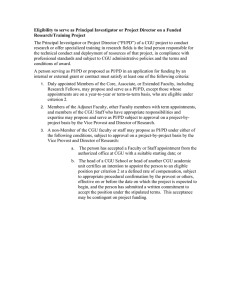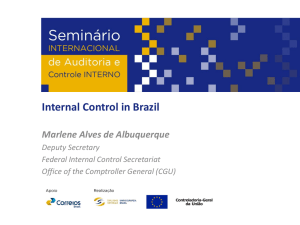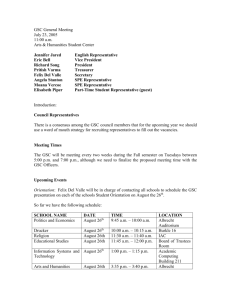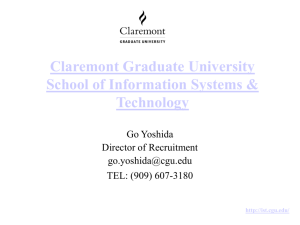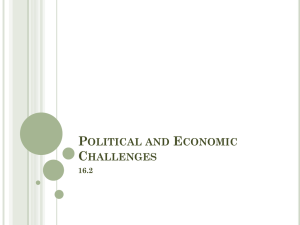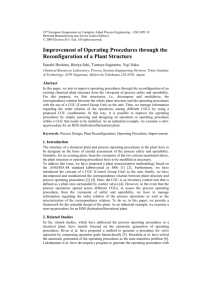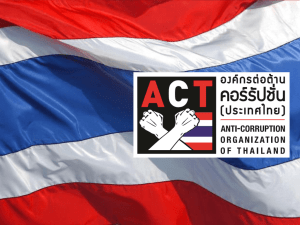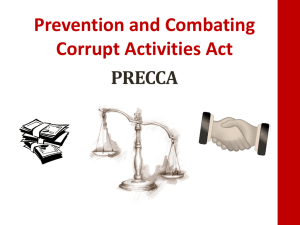and how to fight against corruption?
advertisement
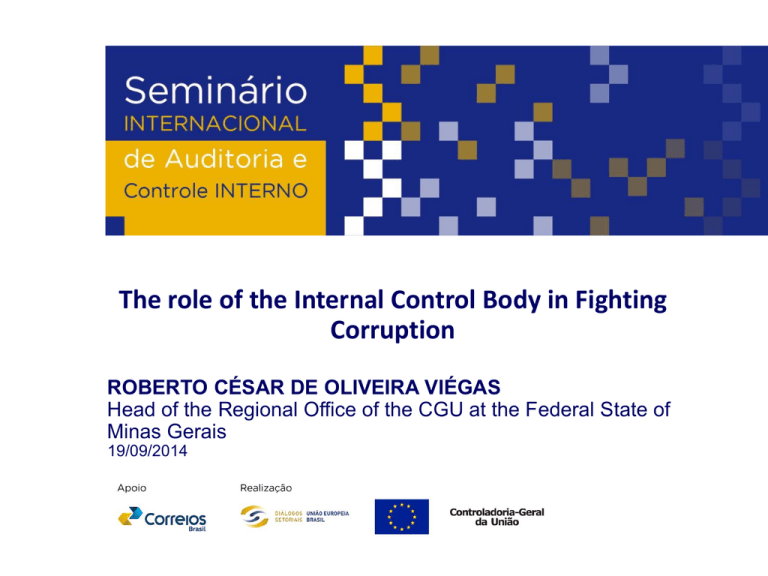
The role of the Internal Control Body in Fighting Corruption ROBERTO CÉSAR DE OLIVEIRA VIÉGAS Head of the Regional Office of the CGU at the Federal State of Minas Gerais 19/09/2014 Roberto César de Oliveira Viégas Head of the Regional Office of the CGU at the Federal State of Minas Gerais Finance and Control Analyst Degree in Economics Master in Economics Post-Graduated in Economic and Political Context Summary CGU – Basic Functions CGU Field Areas The 4 Lines of Action of the Internal Control Inspection How to Fight Against Corruption How may the Internal Control act to Fight Against Corruption - Interinstitutional Coordination, Legal Framework, Information Systems, Policies Improvement Study Cases 3 CGU – Basic Functions CGU is the institution in charge of the Internal Control of the Federal Government, but is also responsible, within the Federal Executive Branch, for the disciplinary function, for the coordination of an Ombudsman System and for preventing and fighting against corruption. 3 Simplified Organogram – CGU Minister of State, Head of the Office of the Comptroller General Vice-Ministry / Executive Secretatiat Federal Internal Control Secretariat Transparency and Corruption Prevention Secretariat National Disciplinary Board 26 Regional Offices at States 5 National Ombudsman’s Office The 4 Lines of Action of the Internal Control: Assessment of the Execution of Public Programs Evaluation of the Managerial Results Training and Orientation Inspections (Investigative Actions) 6 Inspection (Investigative Actions) include: Special Auditing of bodies and entities where CGU has previously identified serious problems; Investigation of citizen complaints or press publications; External Requests – inspections following requests from Public Prosecutors, Federal Police, Parliament members and other authorities; Special shared engagements with the Federal Police 7 AND HOW TO FIGHT AGAINST CORRUPTION? PREVENCTIVELY ACTING, TACKLING MAIN RISK FACTORS THAT FAVOUR THE EMERGENCE AND THE DEVELOPMENT OF FRAUD SCHEMES: A) EXISTENCE OF OPPORTUNITIES B) CONFLITS OF INTEREST C) IMPUNITY 8 EXISTENCE OF OPPORTUNITIES Weak/fragile internal control (accounting or administrative). The administration must constantly improve its controls, where they be logical, technical, corrective, accounting, etc. Untimely inspections/verifications. 9 CONFLITS OF INTEREST Follow not only from poor moral values, but also from the sharing of scarce resources of the Public Budget Negotiation between businessmen and parliamentary members around budgetary amendments 9 CONFLICTS OF INTEREST (PARTY WITH PUBLIC FUNDS) Source: Folha de São Paulo, 19/04/2010 10 CONFLICTS OF INTEREST: “Farinha pouca meu pirão primeiro” (grab what you can and let the devil take the hindmost) Amount spent with festivities Source: Folha de São Paulo, 19/04/2010 11 Budget Amendments WHERE MAY THE INTERNAL CONTROL ACT? The corruption diminishes as the opportunities that lead to their taking place diminish. Timely and adequate punishment of the corruption acts Creation of controls/regulations that alienate fraud and corruption acts in private national and international corporations Assurance that the process of approval and allocation of parliament amendments (to the public budget) obeys transparent and defined rules. 12 HOW MAY THE INTERNAL CONTROL ACT TO FIGHT AGAINST CORRUPTION? A) REFINEMENT OF THE LEGAL FRAMEWORK B) CORRETIONS AND IMPROVEMENTS OF PUBLIC PROGRAMS C) INTERINSTITUTIONAL COOPERATION – PARTNERSHIPS C.1) PRODUCTION OF EVIDENCE TO INVESTIGATIONS AND PROCEDURES AT THE ADMINISTRATIVE, CIVIL AND CRIMINAL AREAS D) CREATION, DEVELOPMENT AND SHARING OF INFORMATION 13 SYSTEMS REFINEMENT OF THE LEGAL FRAMEWORK CGU has been heading significant shifts of the legal framework in recent years to reduce conflicts of interest (Law 12813/2013) and to hold accountable (at the civil and administrative levels) domestic and foreign companies that committed acts against the administration, by means of Law No. 12,846 / 2013 (Clean Company Law). Also worth mentioning the Freedom of Information Act (LAI). 14 INTERINSTITUTIONAL COOPERATION One of the basic guidelines of CGU activities, adopted since 2003, is to favor the cooperation and the partnership with other public entities accountable for the defense of the State interests and for the enhancement of the public management, respecting the differences and responsibilities of each body. 15 CGU – PARTNERSHIPS – LAW 10683/2003 CGU will submit to the Attorney-General for the Federal Government cases that constitute administrative improbity and all that recommend asset freezing, the compensation to the treasury and other measures in charge of that body, as well as will trigger, whenever necessary, the acting of the Federal Court of Accounts, of the Internal Revenue Service, of other bodies of the Internal Control System of the Federal Executive Branch and, whenever signals of criminal responsibility are available, the Department of Federal Police and the Public Prosecutor, including when regarding representations or complaints that may seem manifestly calumnious. 16 • (Extracted from § 3º, art. 18, Law 10683/2003) Cooperation with the Federal Prosecution Office Classes of Action started by the Prosecution Office, 2004 to 2014 (Rel. CGU) Civil Investigation: 3.096 Notification of Facts: 1507 Administrative Procedure: 50 Investigative Criminal Procedure: 140 Preparatory Procedure: 1598 Total............................... 6391 Cooperation in Inspection Engagements (Technical Cooperation Protocol 2014) 17 Partnership with the Federal Police Joint Special Operations; Technical collaboration on Police Inquiries and Investigations; Sharing of information for the purpose of liability of public servants and contractors; Ensuring the safety of CGU staff when inspections / audits take place. 18 156 Special Operations 2003-2014 1410 arrests – 372 arrests of public servants US$ 1,1 billion (estimated loss) 19 Concrete cases of joint engagements 38º Municipal Lottery – Brejo de Areia/MA Esopo Operation Sufrágio Livre (Free Suffrage), Orthoptera I and II Operations 20 38th Municipal Lottery – Brejo de Areia/MA - Context Breach of legislation resulting in negative effects on the execution of the audit engagements Use of technology without overlooking operational issues: a) Queries to systems and sparse documentation presented revealed that R$ 2.8 millions were spent on reforms of municipal schools b) Site visit enabled carrying out interviews and preparing reports (key evidences for prosecution) Search and seizure order provided a snapshot of the municipality situation (documentary and physical) Strengthening of the Municipal Lottery Program 21 38th Municipal Lottery – Brejo de Areia/MA - Limits 22 38º Sorteio – Brejo de Areia/MA 24 Municipal School Centro dos Cloves Municipal School Andiroba Expenditure with reform Expenditure with reform 2012: R$ 52.548,97 2012: R$ 139.826,15 2011: R$ 122.412,66 ESOPO/MG - Context Originated from an engagement within the Annual Rendering of Accounts Transfer of funds from an entity of the “S System” (parafiscal system) to an OSCIP (NGO) CGU inspection deepened by an audit engagement of the PROJOVEM Program (Labour Ministry) NGO got undue benefits in public procurement NGO was the financial operator of a criminal organization Use of shell companies for money laundry Estimated loss of US$ 168.000,00 26 ESOPO/MG - Context ENTITY OF THE PARAFISCAL SYSTEM OSCIP (NGO) SHELL (FAKE) COMPANY 27 ESOPO/MG - Limits 27 ESOPO/MG - Limits 28 SUFRÁGIO LIVRE (Free Suffrage) – The event that gave rise to the series Background of legislation improvements – Decree 7507/2011 Municipality already investigated in another Police Operation Beginning of the use of financial information extracted from the System for Transfer of Public Payments Use of federal funds to finance candidates running for municipal representations (2008 election) Limitation overcame with the breach of bank secrecy achieved at the 1st instance (electoral courts). 29 SUFRÁGIO LIVRE – The event that gave rise to the series Bank statement – PNAC Program 30 SUFRÁGIO LIVRE – The event that gave rise to the series Bank statement – Food Scholarship Program 31 SUFRÁGIO LIVRE – The event that gave rise to the series Recorded details of the banking activity 32 SUFRÁGIO LIVRE (FREE SUFFRAGE) – Press News 32 ORTHOPTERAS I and II Background of legislation improvements – Decree 7507/2011 Use of Information Systems (BB RPG, SIAFI, TSE) Focus of the analysis were the suspicious disbursement operations: cash withdrawals, check cash, transfers to other accounts of the municipality (gateway accounts) Inversion of the normal order of the analyzes carried out so far: audit began monitoring the financial account, documentary analysis and site visit after breach of secrecy Limitation overcame with the breach of bank secrecy (MPF and MPE) achieved at the 1st instance 33 ORTHOPTERAS I and II - News 34 Challenges of the Internal Control when Fighting Against Corruption Fighting against fraud and corruption requires an ongoing learning process and the constitution of centers of excellence Special Action (Inspection) Teams – permanency and further development Access to confidential information (guarded by third parties) Enhancement and sharing of IT Tools Thank you! Roberto César de Oliveira Viégas Head of the Regional Office at Minas Gerais Office of the Comptroller General
